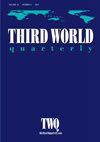Strengths-based Gram Sabhas? Challenges and radical possibilities when ‘measuring’ poverty in India
IF 1.8
2区 经济学
Q2 DEVELOPMENT STUDIES
引用次数: 0
Abstract
Abstract Poverty as an object of study in India continues to be the domain of economists, statisticians and demographers. The National Sample Survey Organisation (NSS) serves as the main instrument of data collection to measure poverty relative to economic indicators. In this paper we draw on strengths-based research undertaken in an Indian village to foreground alternative ways of conceptualising and practising data collection when measuring poverty. Explored through an analytics of biopolitics, asset-mapping exercises with young people and women revealed new subjectivities that emerged via illustrative meaning-making and dialogue. This approach to poverty measurement facilitated methods and produced outcomes that were less calculated and predefined than the NSS, and encouraged participation, even questioning of the status quo, in the ‘doing’ of the methodology itself. A strengths orientation to poverty opens up radical possibilities, particularly in India where the state-sanctioned self-governing body, the Gram Sabhas, has a mandate to provide for the most marginalised groups. And while this governing body is not free from power imbalances, the potential it offers, when combined with strengths-based approaches (SBA) that value people for the expertise they already have, demands renewed attention in practitioner and policy debates in the country.基于力量的Gram Sabhas?在印度“衡量”贫困时面临的挑战和激进的可能性
在印度,贫困作为一个研究对象一直是经济学家、统计学家和人口学家的研究领域。国家抽样调查组织(NSS)是收集数据的主要工具,以衡量相对于经济指标的贫困程度。在本文中,我们借鉴了在印度一个村庄进行的基于优势的研究,以展望在衡量贫困时概念化和实践数据收集的替代方法。通过对生命政治的分析,与年轻人和妇女进行的资产映射练习揭示了通过说明性意义创造和对话出现的新的主体性。这种衡量贫困的方法促进了方法和产生的结果,而这些方法和结果的计算和预先定义比国家安全保障体系少,并鼓励参与,甚至对现状提出质疑,参与方法本身的“实施”。针对贫困的优势导向开辟了激进的可能性,尤其是在印度,国家认可的自治机构——印度议会(Gram Sabhas)的任务是为最边缘化的群体提供服务。虽然这个管理机构并没有摆脱权力不平衡,但它所提供的潜力,与重视人们已有专业知识的基于优势的方法(SBA)相结合,需要在该国的实践和政策辩论中重新得到关注。
本文章由计算机程序翻译,如有差异,请以英文原文为准。
求助全文
约1分钟内获得全文
求助全文
来源期刊

Third World Quarterly
DEVELOPMENT STUDIES-
CiteScore
4.10
自引率
15.00%
发文量
137
期刊介绍:
Third World Quarterly ( TWQ ) is the leading journal of scholarship and policy in the field of international studies. For almost four decades it has set the agenda of the global debate on development discourses. As the most influential academic journal covering the emerging worlds, TWQ is at the forefront of analysis and commentary on fundamental issues of global concern. TWQ examines all the issues that affect the many Third Worlds and is not averse to publishing provocative and exploratory articles, especially if they have the merit of opening up emerging areas of research that have not been given sufficient attention. TWQ is a peer-reviewed journal that looks beyond strict "development studies", providing an alternative and over-arching reflective analysis of micro-economic and grassroot efforts of development practitioners and planners. It furnishes expert insight into crucial issues before they impinge upon global media attention. TWQ acts as an almanac linking the academic terrains of the various contemporary area studies - African, Asian, Latin American and Middle Eastern - in an interdisciplinary manner with the publication of informative, innovative and investigative articles. Contributions are rigorously assessed by regional experts.
 求助内容:
求助内容: 应助结果提醒方式:
应助结果提醒方式:


